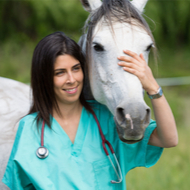
Podcast now includes real-life stories and clinical catch-up recordings.
The British Equine Veterinary Association (BEVA) has overhauled its popular BEVApod channel to include new real-life features, clinical catch-up content and the latest news and opinion.
The fortnightly podcast aims to keep members informed and entertained while travelling between clients or unwinding after a busy day. Since its launch two years ago, the podcast has become so popular that members have been requesting more content.
The new BEVApod promises more regular features from equine vet Brad Hill, a clinical assistant professor in equine practice at the University of Nottingham, who will be exploring the many aspects of life in equine practice.
Brad will also be sharing real-life stories to help promote a sense of togetherness and promote mental wellbeing.
“Although based at Nottingham, I am passionate about maintaining links to all areas of the equine profession,” he said.“This podcast will provide a platform to bring the experiences of others directly to the listener wherever they are.”
BEVApod will also feature monthly clinical episodes taken from the BEVA Clinical Catch-Up recordings. These are live webinars where BEVA invites a practitioner to present a clinical topic and open it up for discussion.
“We have turned the recordings of these into podcasts so that our members can listen to the recordings whilst travelling between clients," said BEVA President Lucy Grieve. "It makes great use of travel time and fills the void we all sometimes feel when we are alone with just our thoughts in the car.”



 The Federation of Independent Veterinary Practices (FIVP) has announced a third season of its podcast, Practice Matters.
The Federation of Independent Veterinary Practices (FIVP) has announced a third season of its podcast, Practice Matters.